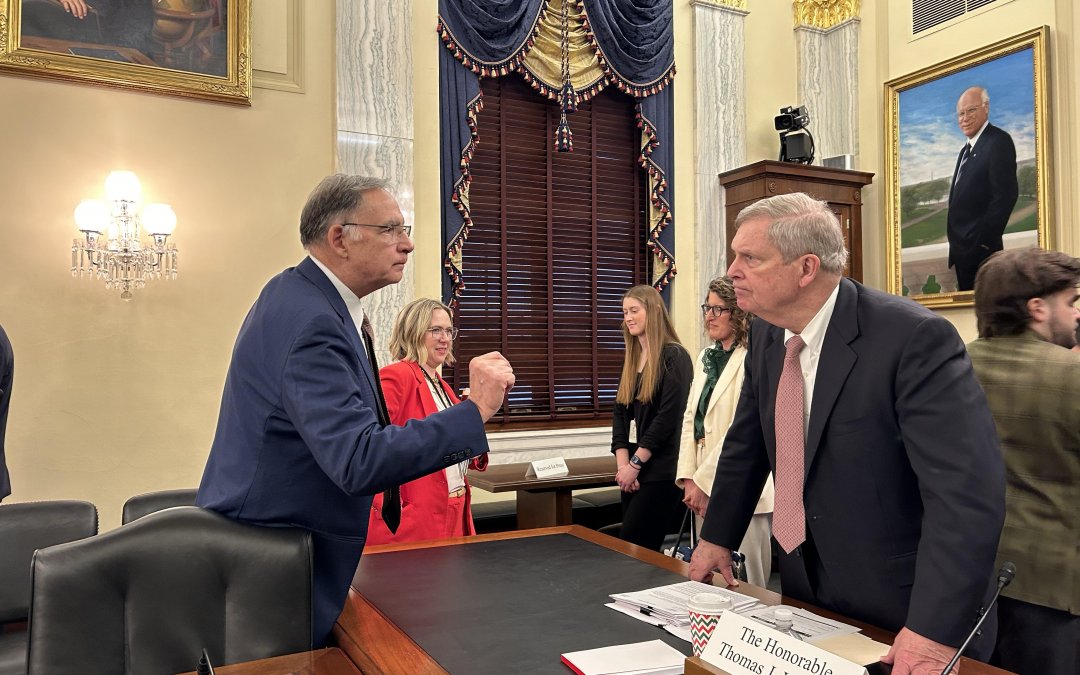WASHINGTON – Agriculture Secretary Tom Vilsack warned lawmakers that preparing for potential government shutdown is “an extraordinary waste of time and resources.”
“This team is working their tail off,” Vilsack said on Wednesday during a USDA oversight hearing by the Senate agriculture committee. “So please don’t tell me the work’s not getting done, because I can show you that it is.”
A partial government shutdown still looms next week despite a one-week funding extension. The plan that passed the House on Thursday would extend funding for the departments of Veterans Affairs, Interior, Housing and Urban Development, Energy and Transportation, Agriculture and the Environmental Protection Agency – but only until March 8.
It is the fourth time in recent years that the Agriculture Department has had to plan for a government shutdown, Vilsack said.
If the USDA is shut down after next week, beneficiaries of multiple programs would face harm. This includes farmers seeking loans or disaster assistance, researchers on yearslong projects as well as recipients of the Supplemental Nutrition Assistance Program, commonly called food stamps, and the Special Supplemental Nutrition Program for Women, Infants and Children.
As part of their oversight role, senators raised concerns to the USDA secretary that their constituents had brought up.
Multiple lawmakers said their states have experienced unprecedented natural disasters – like floods, droughts and wildfires – in the past year that have harmed their agriculture sectors.
“It’s a tough time” for Alabama farmers,” said Sen. Tommy Tuberville (R-Ala.).
“The farmers in Alabama, you know, it seems like every other phone call I get is about something different that they’re having to face, whether it’s climate change or whether it’s the high cost of fertilizer – all the things that are coming at them at once,” Tuberville added.
While top lawmakers have agreed to push the funding deadline another week, partisan gridlock threatens the reauthorization of the farm bill, which expires every five years and sets policies for agriculture, nutrition, conservation and forestry.
The current farm bill will run out Sept. 30 after being extended one year from its initial expiration date. Until then, the USDA will operate based on the current farm bill, Vilsack told reporters after the hearing.
Senators on both sides of the aisle agreed that the bill should include a robust farm safety net.
Many Republicans, like ranking member John Boozman (R-Ark.), were also worried about declining net profits for farms nationwide.
“What I’ve heard from our nation’s farmers and ranchers is that they’re very concerned,” Boozman said. “If we truly care about rural communities on our farm and ranch families, farming at all scales must be economically viable, and we must provide a safety net that works.”
Earlier this month, the USDA forecasted that net farm income would drop by 27.1%.
Vilsack said profit loss is due to weak global economies, rather than the U.S. economy, which has record low levels of unemployment and poverty.
“Do we want to weaken the American economy so people aren’t buying stuff?” he asked.
According to Vilsack, the USDA is focusing on creating opportunities for farmers to get multiple sources of revenue so they do not have to work “two full-time jobs” to sustain their farms.
He said investing in new markets, climate-smart agriculture, renewable energy and local food systems can “provide opportunities for farmers to do what they love to do.”
In 2023, the USDA awarded more than $1 billion in grants to 81 projects for agricultural conservation.
Despite gridlock over the details of the farm bill, both Democratic and Republican lawmakers expressed their hope to get a bill passed in order to help their communities.
“Division is not the way to make progress in this country,” Sen. Michael Bennet (D-Colo.) said. “It’s not the way to make progress in agriculture.”

